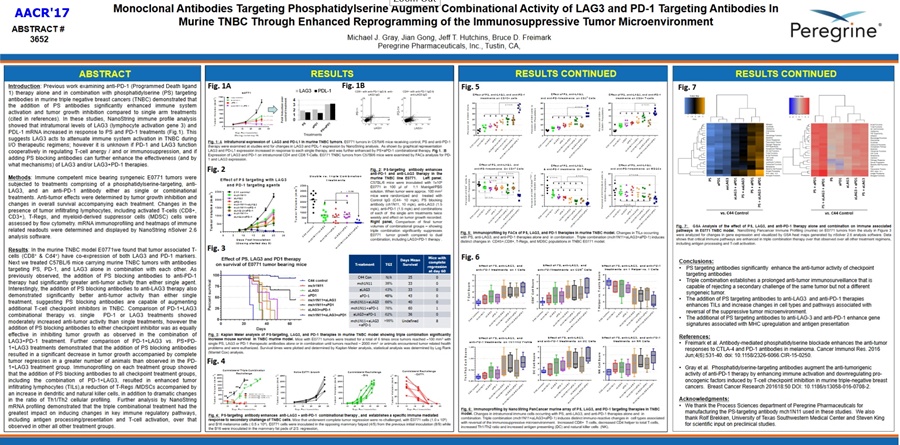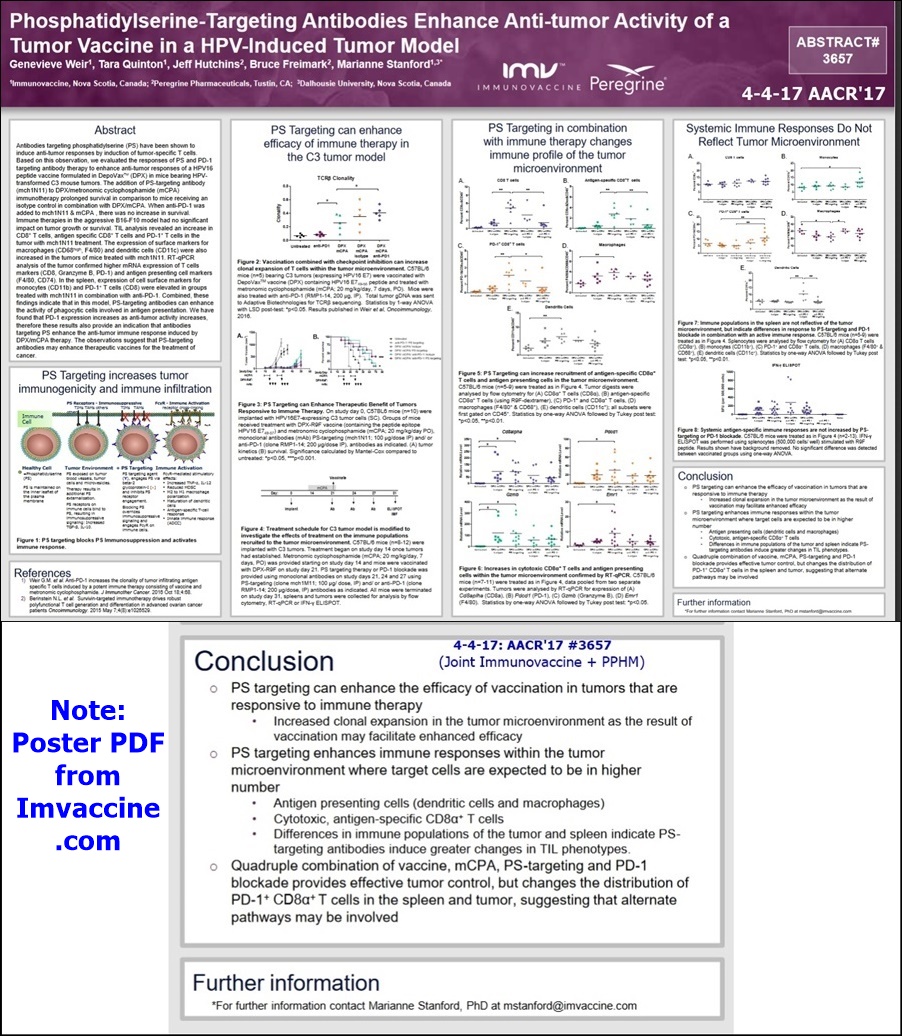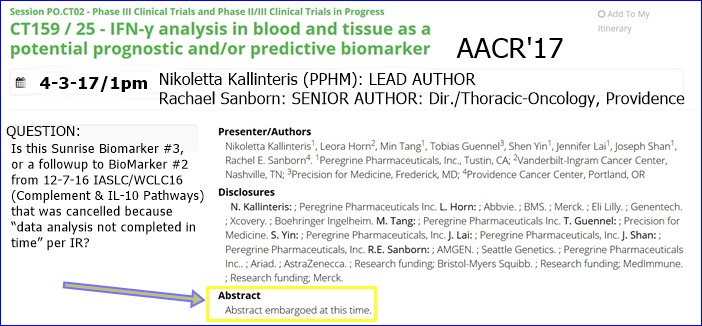Replies to post #294957 on Avid Bioservices Inc (CDMO)















FROM PPHM’s 4-3-17 PR: http://ir.peregrineinc.com/releasedetail.cfm?ReleaseID=1019762
…”Latest Findings from Ongoing Collaboration with Memorial Sloan Kettering (MSK) Support Potential Applications for Combining CAR T & Anti-PS in Treatment of Solid Tumors”… For this study, a team of MSK researchers led by cancer immunotherapy thought-leaders, Taha Merghoub, Ph.D. and Jedd D. Wolchok, M.D., Ph.D., evaluated and compared the anti-tumor activity and off-target toxicities of adoptive T cell transfer therapy in combination with either PS-targeting antibodies or anti-OX40 antibodies in mice with advanced melanomas. Whereas PS-targeting and anti-OX40 demonstrated comparable tumor regression when administered in combination with transferred adoptive T cells, only the PS-targeting combination achieved these results without any off-target toxicities. By contrast, the anti-OX40 treatment combination triggered off-target inflammatory destruction of healthy tissues. Additional study results demonstrated that the PS-targeting antibodies decreased tumor-induced immunosuppression as evidenced by a decrease in immunosuppressive regulatory T cells (Tregs) and M2 macrophages. This finding is consistent with Peregrine’s belief that bavituximab may modulate the immunosuppressive tumor microenvironment and enhance the activity of immunotherapy agents.
Taha Merghoub, Ph.D., Co-Dir. of the Ludwig Collaborative Laboratory at MSK:
“While adoptive T cell transfer remains one of the most exciting new approaches to treating cancer, to date the toxicity associated with the treatment has limited its potential. We are encouraged that these study results showed that the combination of anti-PS and adoptive T cell treatment led to enhanced anti-tumor effect without any evidence of additional off-target side effects. “We believe that these findings may support potential applications for this combination in solid tumors in the future.”
Joseph Shan, Peregrine’s VP of Clinical & Regulatory Affairs:
“These study results provide further support for our belief that anti-PS agents such as bavituximab can play an important role as part of combination cancer treatments. This is directly tied to the agents’ ability to modulate the tumor microenvironment to combat the immunosuppression that limits the activity of CAR T and immunotherapies. Importantly, we are now also seeing evidence that this targeted modulation of the tumor microenvironment by anti-PS allows for enhanced activity of these other treatments without triggering any off-target toxicities. This is opposed to other conventional immunotherapies such as anti-OX40 with systemic mechanisms of action. We believe this advantageous tolerability profile will be a key benefit in positioning anti-PS agents for inclusion in optimal combination cancer regimens.”
....
....
Aug 8 2018
Anti-CD37 chimeric antigen receptor T cells are active against B and T cell lymphomas.
Scarfò I1, Ormhøj M2, Frigault MJ3, Castano AP1, Lorrey S1, Bouffard AA1, van Scoyk A4, Rodig SJ5, Shay AJ6, Aster JC5, Preffer FI6, Weinstock DM7, Maus MV8.
Author information
1
Cellular Immunotherapy Program, Massachusetts General Hospital Cancer Center, Charlestown, MA, United States.
2
Department of Clinical Immunology, Odense University Hospital, University of Southern Denmark, Odense, Denmark.
3
Harvard Medical School, Boston, MA, United States.
4
Department of Medical Oncology, Dana-Farber Cancer Institute, Boston, MA, United States.
5
Department of Pathology, Brigham and Women's Hospital, Boston, MA, United States.
6
Department of Pathology, Massachusetts General Hospital, Boston, MA, United States.
7
Broad Institute of Harvard and MIT, Cambridge, MA, United States.
8
Cellular Immunotherapy Program, Massachusetts General Hospital Cancer Center, Boston, MA, United States mvmaus@mgh.harvard.edu.
Abstract
Chimeric antigen receptor (CAR) T cells have emerged as a novel form of treatment for patients with B-cell malignancies. In particular, anti-CD19 CAR T-cell therapy has effected impressive clinical responses in B-cell acute lymphoblastic leukemia (ALL) and diffuse large B-cell lymphoma (DLBCL). However, not all patients respond, and relapse with antigen loss has been observed in all patient subsets. Here, we report on the design and optimization of a novel CAR directed to the surface antigen CD37, which is expressed in B-cell non-Hodgkin Lymphomas, in chronic lymphocytic leukemia (CLL) and in some cases of cutaneous and peripheral T-cell lymphomas (CTCL and PTCL, respectively). We found that CAR-37 T cells demonstrated antigen-specific activation, cytokine production, and cytotoxic activity in models of B- and T-cell lymphomas in vitro and in vivo, including patient-derived xenografts. Taken together, these results are the first showing that T cells expressing anti-CD37 CAR have substantial activity against 2 different lymphoid lineages, without evidence of significant T cell fratricide. Furthermore, anti-CD37 CARs were readily combined with anti-CD19 CARs to generate dual-specific CAR T cells capable of recognizing CD19 and CD37 alone or in combination. Our findings indicate that CD37-CAR T cells represent a novel therapeutic agent for the treatment of patients with CD37-expressing lymphoid malignancies.
https://www.ncbi.nlm.nih.gov/pubmed/30089630
| Volume | |
| Day Range: | |
| Bid Price | |
| Ask Price | |
| Last Trade Time: |